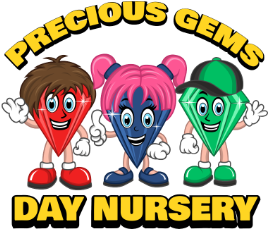Social Skills and Interaction: How Nurseries Help Your Child Develop Friendships
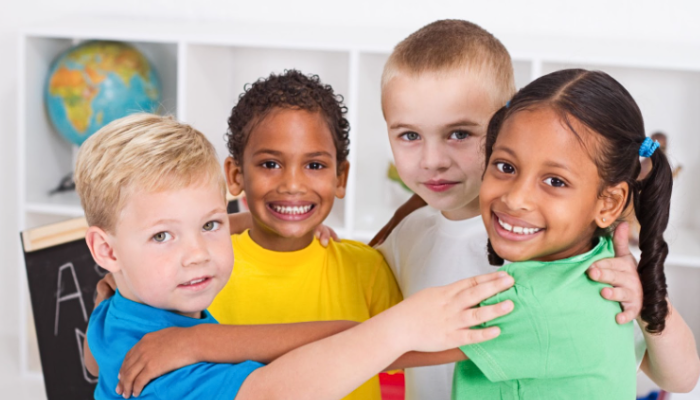
As a parent, you have certainly wondered how your child will learn to share toys, form friendships, and manage the tricky world of human relationships. Well, you are in the right place. We are more than just caretakers at Precious Gems Nursery; we also foster friendships, develop social skills, and whisper to tiny humans. We’ll look at how important it is for nurseries like ours to assist your kid develop social skills and make those priceless first friendships in this in-depth guide. Now grab a cup of coffee (or tea, we don’t mind) and let’s explore the fascinating world of preschool friends and toddler social butterflies!
The Importance of Early Social Skills
You’ve probably heard the saying, “It takes a village to raise a child.” Well, that village starts right here in our nursery. Early social skills are the building blocks for your child’s future relationships and success. Think of them as the foundation of a house – without a strong foundation, the rest of the structure (in this case, your child’s social life) might wobble or even topple over.
Why do these skills matter so much? Think about it. When was the last time you used algebra in your daily life? Now, when was the last time you had to work with others, resolve a conflict, or make a new friend? Exactly. Social skills are the unsung heroes of our daily lives, quietly working behind the scenes to help us navigate the world of human interaction.
Long-term benefits of strong social skills include:
- Better academic performance
- Higher self-esteem
- Improved mental health
- Greater success in future careers
- Stronger, more fulfilling relationships
- Enhanced ability to handle stress and adversity
-
Increased empathy and emotional intelligence
- Better problem-solving skills in social situations
At Precious Gems Nursery, we’ve created an environment that’s ripe for social growth. It’s like a mini-society where your child can practise these skills daily. From sharing toys to resolving conflicts over who gets to be the “chef” in the play kitchen, every interaction is a learning opportunity. We see our nursery as a social skills gymnasium, where little minds can flex their empathy muscles, practise their turn-taking technique, and build up their conflict resolution endurance.
But it’s not just about learning to play nice. These early social experiences shape how your child views the world and their place in it. A child who learns to navigate social situations confidently in their early years is more likely to approach new experiences with optimism and resilience later in life. They’re building a toolkit of social strategies that they’ll use for years to come.
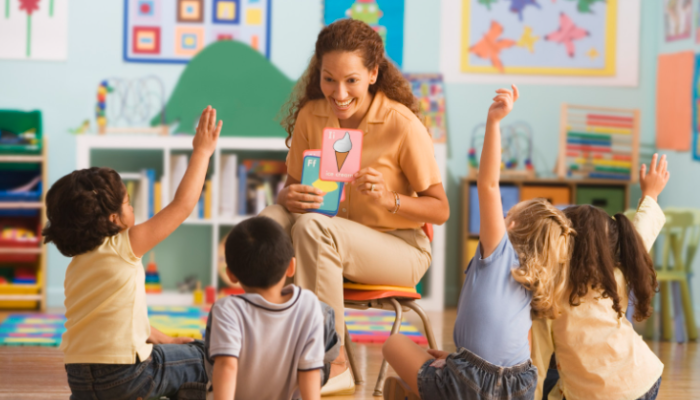
Understanding Social Development in Young Children
Let’s break down what social development looks like in the early years. It’s not just about making friends - it’s a complex process that involves understanding oneself and others. It’s like watching a little scientist at work, constantly observing, hypothesising, and experimenting with social interactions. Here’s a quick rundown of social milestones:
- Age 0-1 Smiles at familiar faces, enjoys playing peek-a-boo, responds to their name
- Age 1-2 Shows affection, plays alongside other children, imitates others’ actions
- Age 2-3 Begins cooperative play, shows empathy, starts to understand turn-taking
- Age 3-4 Takes turns, understands sharing, engages in imaginative play with others
- Age 4-5 Forms friendships, engages in complex imaginative play, understands rules in games
At Precious Gems Nursery, we’re attuned to these stages. We tailor our activities to support each child’s current developmental level while gently nudging them towards the next. It’s like being a social skills DJ – we’re constantly reading the room and adjusting our approach to keep everyone engaged and learning.
Play is the work of childhood, and it’s through play that much of this social learning happens. Whether it’s building a block tower together or pretending to run a shop, these activities are social skill boot camps in disguise. Through play, children learn to:
- Communicate their ideas
- Listen to others
- Negotiate and compromise
- Understand different perspectives
- Regulate their emotions
- Solve problems collaboratively
It’s fascinating to watch how a simple game of “house” can involve complex social negotiations. Who gets to be the mom? What if two children want to be the baby? How do they decide what’s for dinner? These seemingly simple interactions are laying the groundwork for future boardroom discussions and family decisions.
Nursery Activities That Boost Social Interaction
At Precious Gems Nursery, we’re not just babysitters - we’re social skill cultivators. Our activities are carefully designed to promote interaction and cooperation. We believe in creating a rich tapestry of experiences that challenge and excite young minds while fostering social growth.
Here are some of our favourite social boosters:
- Group storytelling: We’ll start a story, and each child adds a bit. It’s creativity and cooperation rolled into one! This activity helps children learn to listen to others, build on ideas, and express themselves verbally.
- Team games: From simple parachute games for toddlers to more complex rule-based games for older kids, these activities teach teamwork and fair play. They learn to celebrate group success and handle disappointment gracefully.
- Buddy system: We pair up children for certain activities, encouraging them to work together and look out for each other. This fosters empathy and helps children practise one-on-one interactions.
- Role-playing scenarios: These help children practise social situations in a safe, supportive environment. From pretending to order in a restaurant to acting out how to join a group at play, these activities build confidence in real-world social situations.
- Group art projects: Collaborative art teaches children to work together towards a common goal. It’s amazing to see how a blank canvas can turn into a masterpiece of cooperation!
- Circle time: This daily ritual helps children practise listening, taking turns speaking, and respecting others’ opinions. It’s like a mini town hall meeting for toddlers!
- Gardening activities: Working together to plant and care for plants teaches patience, responsibility, and the joy of collective achievement.
We balance structured activities with free play. While structured activities teach specific skills, free play allows children to practise these skills independently. It’s like the difference between a dance class and dancing at a party - both are valuable!
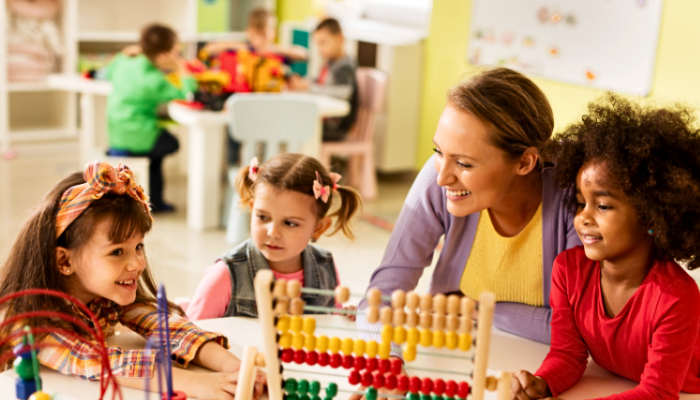
The Nursery Staff’s Role in Facilitating Friendships
Our staff aren’t just observers - they’re active facilitators of social growth. They’ve undergone extensive training in child development and social skills promotion. Think of them as social skill coaches, always ready with a supportive word or a gentle redirect.
Some strategies our staff use include:
- Modelling: They demonstrate positive social interactions in their own behaviour. Children are keen observers, and they learn a lot just by watching how adults interact.
- Narrating: They describe social situations as they happen, helping children understand social cues. For example, “Look, Sarah is smiling. She looks happy to share her toy with you!”
- Scaffolding: They provide just enough support to help children navigate social situations successfully. It’s like teaching a child to ride a bike – we hold on until they’re steady, then gradually let go.
- Encouraging empathy: They help children understand and respond to others’ emotions. “How do you think Tom feels when you take his toy without asking?”
- Facilitating problem-solving: Rather than solving problems for children, they guide them through the process. “You both want the red crayon. What could we do so you’re both happy?”
When conflicts arise (and they will - it’s part of learning!), our staff use these as teaching moments. They guide children through the process of understanding different perspectives, expressing feelings appropriately, and finding mutually satisfactory solutions.
“At Precious Gems Nursery, we don’t just resolve conflicts for children - we teach them how to resolve conflicts themselves. It’s a skill that will serve them well throughout life.” - Sarah Johnson, Lead Educator at Precious Gems Nursery
Our staff also keep a keen eye on group dynamics. They ensure that no child is consistently left out and that friend groups remain fluid and inclusive. They might suggest new playmates or activities to broaden children’s social circles.
Creating a Nurturing Environment for Friendship Building
The physical environment plays a huge role in social development. At Precious Gems Nursery, we’ve carefully designed our space to encourage interaction. It’s like creating a social skills playground, with each area designed to promote different aspects of social development.
Some features of our socially-conducive environment include:
- Cosy corners: Small, intimate spaces where 2-3 children can play quietly together. These areas are perfect for shy children or those who prefer smaller group interactions.
- Open areas: Larger spaces for group activities and more active play. These areas encourage larger group dynamics and more boisterous play.
- Activity stations: Areas set up for specific activities, encouraging children to engage in parallel and cooperative play. From a well-stocked art station to a bustling play kitchen, these areas naturally bring children together around shared interests.
- Reading nooks: Comfortable spaces where children can enjoy books together, fostering a love of reading and providing opportunities for quieter social interactions.
- Dramatic play areas: Spaces equipped with dress-up clothes and props that encourage imaginative play. These areas are hotbeds of social interaction and role-playing.
- Outdoor spaces: Our playground is designed to encourage both active play and quieter interactions, with areas for running and climbing as well as spaces for sand play or nature observation.
We also prioritise diversity and inclusion in our environment. Our books, toys, and decor reflect various cultures and abilities. This exposure helps children develop empathy and understanding for others who may be different from them.
Routine and structure might not seem related to social skills, but they’re crucial. When children know what to expect, they feel secure. And when they feel secure, they’re more likely to reach out and interact with others.
We also consider sensory needs in our environment. Some children are more sensitive to noise or touch, which can affect their social interactions. We provide quieter spaces and fidget toys to help these children regulate their sensory input, making it easier for them to engage socially.
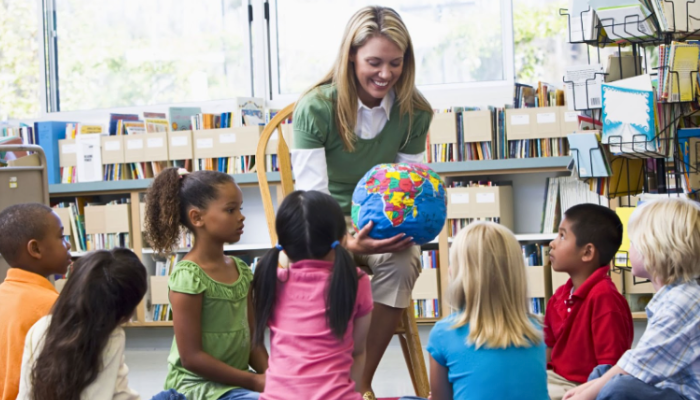
Overcoming Social Challenges in the Nursery Setting
Not every child is a natural social butterfly, and that’s okay! At Precious Gems Nursery, we have strategies to help every child flourish socially. We believe that with the right support, every child can develop strong social skills.
For shy or introverted children:
- We start with one-on-one interactions with a trusted adult
- We gradually introduce small group activities
- We create opportunities for them to shine in their areas of interest
- We respect their need for quiet time and don’t force interactions
- We help other children understand and respect different personality types
For children who struggle with aggressive behaviour:
- We teach alternative ways to express strong emotions
- We use storytelling and role-play to develop empathy
- We provide plenty of physical activities to channel energy positively
- We work closely with parents to ensure consistent approaches at home and nursery
- We use positive reinforcement to encourage gentle behaviour
For children with special needs:
- We adapt activities to ensure everyone can participate
- We educate all children about differences, promoting understanding and inclusion
- We work closely with parents and specialists to provide consistent support
- We may use visual aids or social stories to help explain social situations
- We celebrate each child’s unique strengths and help them use these in social situations
We also keep an eye out for children who might be experiencing temporary social difficulties due to life changes like a new sibling, a move, or family stress. In these cases, we provide extra support and understanding, helping the child navigate their emotions while maintaining social connections.
Remember, every child is unique and will develop social skills at their own pace. Our job is to provide a supportive, inclusive environment where every child feels valued and has the opportunity to grow socially.
The Parent-Nursery Partnership in Social Development
At Precious Gems Nursery, we believe that parents are the most important teachers in a child’s life. That’s why we prioritise open communication about your child’s social progress. We see our relationship with parents as a partnership, working together to support each child’s social development.
We provide:
- Regular updates on your child’s social interactions
- Suggestions for activities you can do at home to reinforce social skills
- Opportunities for parent-child activities at the nursery
- Parent workshops on topics related to social development
- A communication book for daily exchange of information
Consistency between home and nursery is key. When children receive the same messages about social behaviour in both settings, they’re more likely to internalise these lessons. We encourage parents to use similar language and strategies at home. For example, if we’re working on “using our words” to express feelings at nursery, we’ll let parents know so they can reinforce this at home.
We also recognize that parents might have concerns or questions about their child’s social development. We’re always here to listen, offer advice, and work together to address any issues. Sometimes, a behaviour that seems concerning might actually be quite normal for a child’s age. Other times, early intervention can make a big difference. Our experienced staff can help parents navigate these waters.
Remember, you’re not alone in this journey. We’re here to support not just your child, but your whole family as you navigate the exciting world of early childhood social development.
Measuring Social Growth: What to Look For
As a parent, you’re probably wondering how you can tell if your child is developing good social skills. It’s not always as clear-cut as academic skills – there’s no test for kindness or report card for sharing. However, there are certainly signs you can look out for.
Here are some positive signs that indicate good social development:
- Shows interest in other children
- Shares toys without always being prompted
- Takes turns in games and conversations
- Shows empathy when others are upset
- Can express feelings verbally instead of physically
On the flip side, some red flags that might indicate social difficulties include:
- Consistently avoiding interaction with peers
- Frequent aggressive behaviour
- Inability to share or take turns
- Extreme difficulty separating from parents
- Lack of imaginative play
- Inability to name any friends
At Precious Gems Nursery, we regularly assess children’s social development. We use a combination of observation, developmental checklists, and standardised assessments to track progress and identify any areas that might need extra support.
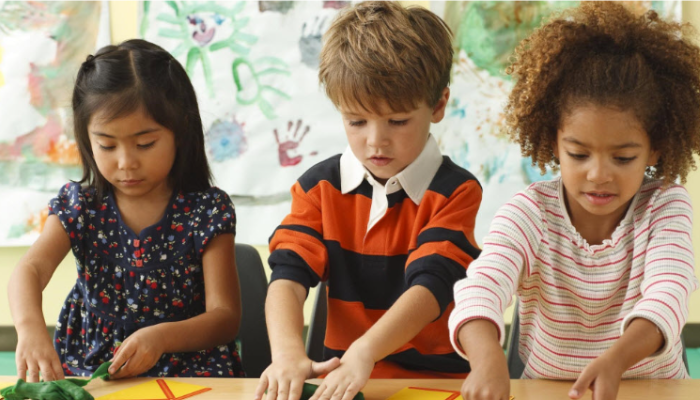
Beyond the Nursery: Preparing for Future Social Success
The social skills your child develops at Precious Gems Nursery don’t stay within our walls. They’re preparing for a lifetime of social interactions. Think of a nursery as a launchpad for your child’s social journey – we’re helping them build the rocket, but they’ll be the ones to pilot it through life.
The transition to school becomes smoother for children who’ve had positive nursery experiences. They’re already familiar with:
- Following routines
- Interacting with peers and adults
- Participating in group activities
- Expressing themselves verbally
- Handling separation from parents
- Resolving conflicts
- Sharing resources and attention
These skills give them a head start in the school environment, allowing them to focus more on academic learning rather than struggling with basic social interactions.
But it goes beyond just school readiness. These early friendship experiences lay the groundwork for future relationships. Children who learn to form positive relationships early on are more likely to have healthy relationships throughout their lives.
Expert Insights: What Child Psychologists Say About Nurseries and Social Skills
Don’t just take our word for it. Child psychologists consistently highlight the importance of early social experiences. The evidence is clear: quality early childhood education, like what we provide at Precious Gems Nursery, plays a crucial role in social development.
Recent research has shown that:
- Children who attend high-quality nurseries show better social skills in primary school
- Early positive peer relationships predict better mental health outcomes in adolescence
- Social skills learned in early childhood have a significant impact on adult life satisfaction
Dr. Emma Thompson, a leading child psychologist, states:
“The social experiences children have in nurseries are invaluable. They learn to navigate complex social situations in a safe, supportive environment. These skills form the foundation for all future relationships.”
It’s a common myth that children need to be a certain age to benefit from social interaction. In reality, even infants are learning social skills through every interaction. From the earliest coos and smiles, babies are learning the basics of communication and social connection.
Conclusion: Your Child’s Social Journey at Precious Gems Nursery
At Precious Gems Nursery, we’re committed to giving your child the best possible start in their social journey. From their first smile to their first best friend, we’re here to support, guide, and celebrate every social milestone.
Remember, every child is unique and develops at their own pace. What matters most is providing a nurturing, stimulating environment where they can grow and learn. That’s exactly what we strive to do every day at Precious Gems Nursery.
We see each child as a precious gem, with their own unique sparkle. Our job is to polish that gem, bringing out its natural brilliance. Through carefully designed activities, a thoughtfully prepared environment, and the guidance of our trained staff, we help your child develop the social skills they’ll need for a lifetime of positive relationships.
But we can’t do it alone. The partnership between nursery and home is crucial. We encourage you to reinforce social skills at home, arrange playdates with nursery friends, and keep us informed about your child’s social experiences outside of nursery. Together, we can create a consistent, supportive environment for your child’s social growth.
As your child grows and develops at Precious Gems Nursery, you’ll likely notice changes:
- They might start talking about friends by name
- You may see them using conflict resolution strategies at home
- They might show more empathy towards siblings or pets
- Their imaginative play might become more complex and social
These are all signs that your child is internalising the social skills they’re learning at nursery. Celebrate these moments – they’re milestones in your child’s social development journey!
So, are you ready to watch your little gem sparkle and shine in the wonderful world of friendships? We can’t wait to be part of this exciting journey with you and your child!
